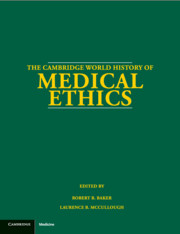Book contents
- Frontmatter
- PART I AN INTRODUCTION TO THE HISTORY OF MEDICAL ETHICS
- PART II A CHRONOLOGY OF MEDICAL ETHICS
- PART III DISCOURSES OF MEDICAL ETHICS THROUGH THE LIFE CYCLE
- PART IV THE DISCOURSES OF RELIGION ON MEDICAL ETHICS
- PART V THE DISCOURSES OF PHILOSOPHY ON MEDICAL ETHICS
- PART VI THE DISCOURSES OF PRACTITIONERS ON MEDICAL ETHICS
- PART VII THE DISCOURSES OF BIOETHICS
- PART VIII DISCOURSES ON MEDICAL ETHICS AND SOCIETY
- Appendix: Biographies: Who Was Who in the History of Medical Ethics
- Bibliography
- Index
Appendix: Biographies: Who Was Who in the History of Medical Ethics
Published online by Cambridge University Press: 28 May 2012
- Frontmatter
- PART I AN INTRODUCTION TO THE HISTORY OF MEDICAL ETHICS
- PART II A CHRONOLOGY OF MEDICAL ETHICS
- PART III DISCOURSES OF MEDICAL ETHICS THROUGH THE LIFE CYCLE
- PART IV THE DISCOURSES OF RELIGION ON MEDICAL ETHICS
- PART V THE DISCOURSES OF PHILOSOPHY ON MEDICAL ETHICS
- PART VI THE DISCOURSES OF PRACTITIONERS ON MEDICAL ETHICS
- PART VII THE DISCOURSES OF BIOETHICS
- PART VIII DISCOURSES ON MEDICAL ETHICS AND SOCIETY
- Appendix: Biographies: Who Was Who in the History of Medical Ethics
- Bibliography
- Index
Summary
ALEXANDER, LEOPOLD (LEO) (VIENNA, AUSTRIA 1905–BOSTON, MASSACHUSETTS 1985)
Austrian-American neurologist, and war crimes investigator, Leo Alexander was born into an assimilated Viennese Jewish family. After completing his training in neurology in 1933 Alexander visited China as a Lecturer. Unable to return to Germany because of Nazi policies excluding Jews from employment in medicine and science, he immigrated to the U.S. in 1934. In 1943, Alexander enlisted in the U.S. army, joining the 7th Army War Crimes Group in 1945, ultimately serving as a consultant to the U.S. prosecution team at the Nuremberg War Crimes Trials (1946–1947).
Inspired by a proposal from another prosecution expert, Andrew Ivy (1893–1978), and concerned that a proposed medical oath (the World Medical Association's [WMA's] 1948 Physician's Oath) (WMA [1948] 1995a) would not suffice to prevent the recurrence of unethical experimentation on human subjects, Alexander penned three memoranda for the prosecution between December 1946 and April 1947. In these memoranda, Alexander proposed that a code of ethics be included in the Tribunal's final judgment to state standards of ethical research on human subjects. The Tribunal adopted Alexander's proposal and the code, which came to be known as the Nuremberg Code, and ultimately set the standard for research ethics for the second half of the twentieth century (United States v. Karl Brandt et al. 1947). According to a leading historian of the Code, Paul Weindling, eight of the Code's ten provisions were formulated in Alexander's memoranda and the Code often replicates lines from Alexander's memoranda word-for-word.
- Type
- Chapter
- Information
- The Cambridge World History of Medical Ethics , pp. 693 - 720Publisher: Cambridge University PressPrint publication year: 2008



